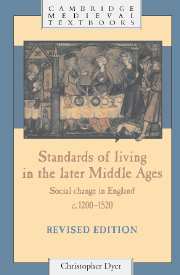Book contents
- Frontmatter
- Contents
- List of illustrations
- List of tables
- Preface
- Acknowledgements
- List of abbreviations
- Weights, measures and places
- Introduction
- 1 Late medieval society
- 2 Aristocratic incomes
- 3 The aristocracy as consumers
- 4 Aristocratic expenditure: making ends meet
- 5 Peasant living standards: modelling the peasant economy
- 6 Peasants as consumers
- 7 Urban standard of living
- 8 The wage-earners
- 9 Poverty and charity
- 10 The weather and standards of living
- Conclusion
- Medieval living standards – postscript
- Bibliography
- Index
- Cambridge Medieval Textbooks
10 - The weather and standards of living
Published online by Cambridge University Press: 05 June 2012
- Frontmatter
- Contents
- List of illustrations
- List of tables
- Preface
- Acknowledgements
- List of abbreviations
- Weights, measures and places
- Introduction
- 1 Late medieval society
- 2 Aristocratic incomes
- 3 The aristocracy as consumers
- 4 Aristocratic expenditure: making ends meet
- 5 Peasant living standards: modelling the peasant economy
- 6 Peasants as consumers
- 7 Urban standard of living
- 8 The wage-earners
- 9 Poverty and charity
- 10 The weather and standards of living
- Conclusion
- Medieval living standards – postscript
- Bibliography
- Index
- Cambridge Medieval Textbooks
Summary
The climate helped to determine living standards in any pre-industrial society. When contemporaries talked of good years and bad, they were usually referring to the quality of the harvest and its effect on grain prices. The unpredictability of the weather left medieval people in a constant state of insecurity, and climatic freaks like the great wind of 15 January 1362 were regarded as portents of the Day of judgement.
We can take a long-term view of the climate, and attempt to estimate the consequences for living standards of shifts in annual average rainfall or temperature. And we need to assess the year-to-year fluctuations that exercised contemporaries, by comparing the frequency of bad years from one period to another.
No subject has caused such divisions of opinion as the role of climate in history. For a long time the whole field of study was discredited by glib determinists who needed only to find simultaneous climatic and historical events to assume a causal connection. A more thoughtful approach began with the plausible and well-reasoned arguments of Scandinavian scholars, who linked the desertion of settlements and the abandonment of arable land in northern Europe with a climatic deterioration that began in about 1300. However, many of the apparent symptoms of worsening weather that they cited are capable of other explanations. The English vineyards, for example, seem to have declined because of competition from Gascon imports rather than as a result of colder weather.
- Type
- Chapter
- Information
- Standards of Living in the Later Middle AgesSocial Change in England c.1200–1520, pp. 258 - 273Publisher: Cambridge University PressPrint publication year: 1989



